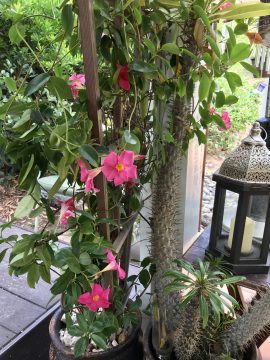by Shadab Zeest Hashmi
 We get half a sunny day every other day since Corona has coaxed us to quit public spaces. In the past fortnight or so, sunlight has been in short supply just as masks, disinfectant spray and toilet paper. When the sun is out, it’s no ordinary gift; it brings a rush of joy that wipes out not only the free-floating, dystopic COVID -19 anxiety, but also the other recent traumas we’ve faced as a family. Indoors, socially-distant by three feet, hunched over our phones for news of loved ones, we forget it is spring, but mornings the sunlight hits the windows feel as if God has turned on the power-wash setting: one is shocked into vigor, tricked into optimism. On such a day, I step down the patio threshold as if pulled by a magnet; just out of the shower and still combing my wet hair, I’m suddenly aware of another gift— soap.
We get half a sunny day every other day since Corona has coaxed us to quit public spaces. In the past fortnight or so, sunlight has been in short supply just as masks, disinfectant spray and toilet paper. When the sun is out, it’s no ordinary gift; it brings a rush of joy that wipes out not only the free-floating, dystopic COVID -19 anxiety, but also the other recent traumas we’ve faced as a family. Indoors, socially-distant by three feet, hunched over our phones for news of loved ones, we forget it is spring, but mornings the sunlight hits the windows feel as if God has turned on the power-wash setting: one is shocked into vigor, tricked into optimism. On such a day, I step down the patio threshold as if pulled by a magnet; just out of the shower and still combing my wet hair, I’m suddenly aware of another gift— soap.
In recent months, my husband and I have been involved in taking care of our critically ill parents; each of them has somewhat recovered by now but our heads are still swimming with hospital visits, devastating scenes of witnessing the pain, discomfort and breach of privacy of those we love the most in this world. We step forward and offer what meager solace or cure we can muster but we are aware of limits. We’ve seen more needles, tubes, blinking-, beeping- monitors, procedures, more bruises on our loved ones’ skins in two months than our whole lifetimes. Reality is clothed in the clinical language of unpronounceable drugs, softened and made bearable by a sister, who, as a doctor, filters and translates it into the personalized language we need in order to participate in healing.
During this time, Corona has become a growing threat; fatigued and stressed, we wash and wash our hands in the hospital, at home, and come back to hold our parents’ hands; soap lingers in the air. We have not held their hands for as long as this since we were children. We are aware that any of us could be carriers of the deadly virus, also that distancing is antithetical to caregiving. And now, under lockdown, the thought occurs to me that our sadness and theirs is lessened by touch and contamination is lessened by soap.
The sun, with its own precise calculus, its varying angles and degrees of warmth, illuminates spring in a grand gesture: papaya, tomato, still in seedlings, vines covering a forgotten lantern, pomegranate buds visible, weeds growing over a cork trivet, Algerian mandarins, apples and lemons blossoming, mini guavas ripening. By ourselves for the first time in months, my husband and I sit in the yard, drinking tea, feet hammocked in the kids’ swings. The scent of coconut soap envelops me as I comb my hair while talking to him. The yard is populated with memories. In a time of isolation, I recall gatherings in this yard, gatherings of family and poet-friends; in the season of spring, I recall the yard of my childhood— playing with my brothers, making soap bubbles, being bathed and massaged by my mother.
Uncertainty, and a measure of anxiety and sadness are part of the historical moment. Spring too is part of the moment; it is full-bodied and real and vivifying— so much so, that for once in years my husband and I have left our phones inside the house. I’m startled, realizing that the tea in our cups is long gone and my wet hair is completely dry by the time our conversation is interrupted by a bee.
